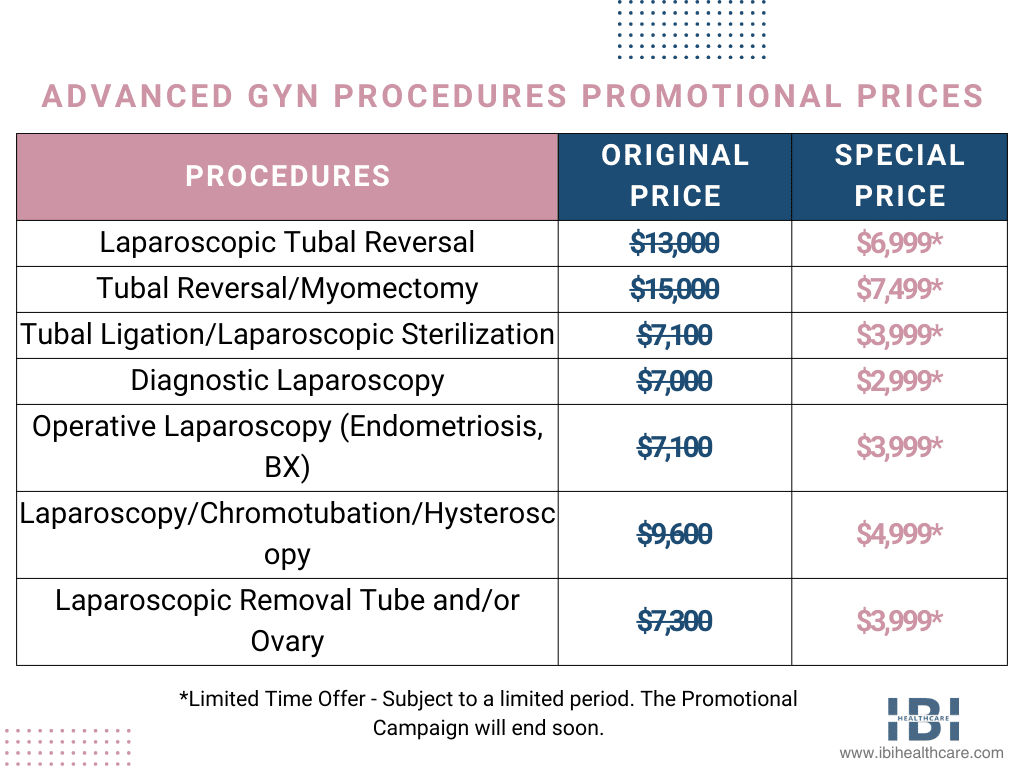Women’s Reproductive Health
Blood Pressure Monitoring
Nutrition Services and Counseling
Common Skin Disorders
Advanced GYN Center - Tubal Procedures
Experience Personalized Care at IBI Advanced GYN Center. Explore Women’s Reproductive Health, Tubal Ligation, and Reversal Procedures. In particular, Tubal Ligation Reversal surgery has the potential to restore fertility for women who have undergone tubal sterilization. Furthermore, this procedure reconnects the fallopian tubes after a woman has had her “tubes tied”. Additionally, it restores their natural function and creates fertility in 80% of outcomes.
Equally important, an anesthesiologist administers general anesthesia for the procedure at an outpatient center. Typically it takes approximately two hours. Coupled with this, a two-inch incision provides access to the abdomen. Then the surgeon identifies the tubes before surgically excising the area of blockage. To emphasize, the surgeon then carefully reconnects the free ends of the fallopian tube using a very fine suture.
Undoubtedly, younger patients under 40 years old experience the most successful tubal ligation reversals. Clearly, women who have three or more inches of healthy tubes remain after tubal procedure. To repeat, surgeons originally blocked tubes using clips, rings, or minimal burning.
In particular, tubal ligation reversal refers to “untying tubes.” Contrarily to tubal ligation, the surgeons unblock the fallopian tubes to help the individual get pregnant.
Surgeons often perform tubal ligation surgery, commonly known as “getting tubes tied.” That is the most common form of female sterilization, to prevent pregnancy.

Advanced GYN Center - Tubal Ligation and Reversal FAQs
Hair loss, fatigue, and low libido are just a few examples of the common symptoms of a hormone imbalance. In women, a hormone imbalance may cause unwanted physical manifestations. Such as facial hair, acne, and difficulty in managing weight gain. These effects may stem from several health issues. For instance, adrenal fatigue, thyroid disease, estrogen dominance, hyperandrogenism, metabolic syndrome, or sexual dysfunction. All of these are treatable with bioidentical hormone treatment.
These hormones are biochemically and structurally the same as the ones your body produces. Later, they create a more balanced hormonal state when introduced.
Women Reproductive Health - Bioidentical Hormone Replacement
In tubal ligation, a form of permanent birth control. Surgeons cut, tie, cauterize, or block the fallopian tubes to prevent the release of an egg. Tubal ligation is for women who no longer want to conceive a child. However, it does not affect your menstrual cycle or protect against STDs.
Some forms of tubal ligation may require minor surgery, or surgeons can complete it during a C-section. While, surgeons can complete other forms as an outpatient procedure. There are risks and benefits to each form of tubal ligation. Indeed, visit with your doctor at IBI Healthcare Institute can help you make the best choice.
Tubal ligation is one of the most effective forms of birth control. Fewer than one in 100 women will conceive after having a tubal ligation. The younger you are when your tubal ligation is performed, the greater the likelihood the procedure will fail.
Another possible complication is ectopic pregnancy. This occurs if sperm is able to fertilize an egg and the egg implants itself inside the fallopian tube. Ectopic pregnancies require immediate medical attention, so call your doctor if you suspect one.
In some cases, it is possible to reverse tubal procedure. If your tubes were originally blocked by clips, rings, or burned, you are a candidate for the procedure. And if you have three or more inches of healthy tubes remaining and are under the age of 40.
Statistics show that a reversal procedure can restore fertility in about 80% of women.*
Your doctor will outline how to reverse the procedure depending on how they performed your tubal ligation. During the reversal surgery, your doctor makes a two-inch incision on your abdomen while you are under anesthesia.
Your doctor locates the fallopian tubes, removes the area of blockage, and reconnects the healthy portions of your fallopian tubes with a very fine surgical suture. The entire surgery takes about two hours, and you return home the same day.
You recover over the next one to two weeks and can slowly return to your normal activities. If complications arise, call your doctor immediately for treatment.
Call IBI Healthcare Institute or schedule a consultation online today if you are interested in tubal ligation or would like to have it reversed.
Advanced GYN Center - Contraception
A key part of women’s health is empowering women to make choices about contraception. IBI Healthcare Institute offers several options to women looking for a birth control solution. Aside from traditional oral pills including a monthly contraceptive vaginal ring. A hormone-secreting IUD that lasts up to five years. Lastly, a permanent surgical procedure.
Women Reproductive Health - Incontinence and Pelvic Floor Defects
There are two main types of urinary incontinence. These are stress urinary incontinence (SUI) and urge urinary incontinence (UUI). However, if you have SUI, you may lose urine. Particularly, when you laugh, sneeze cough, or exercise. Furthermore, if you have UUI you might have sudden losses of urine. Even supposing, without any warning, or the inability to reach the bathroom before you start leaking.
Equally important, after completing urodynamic measurement tests. Your doctor will determine if these issues are a symptom of pelvic floor defects. The connective tissue that holds your female organs in place weakens, causing a bladder prolapse, rectal prolapse, or uterine prolapse.






